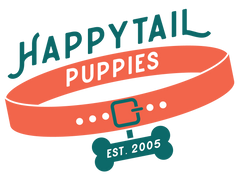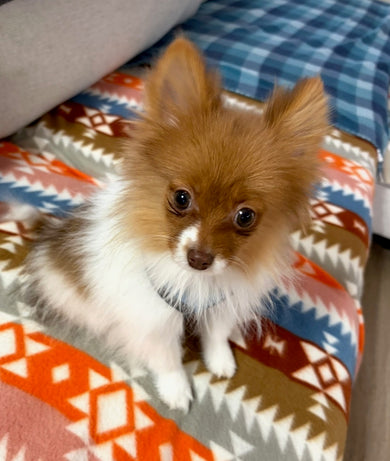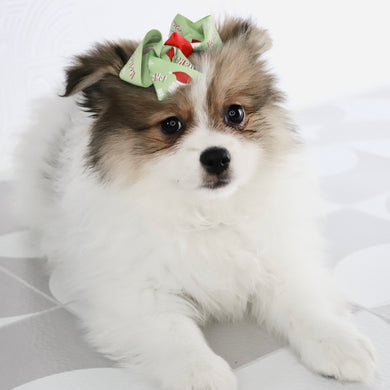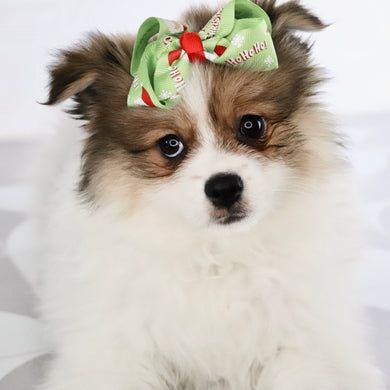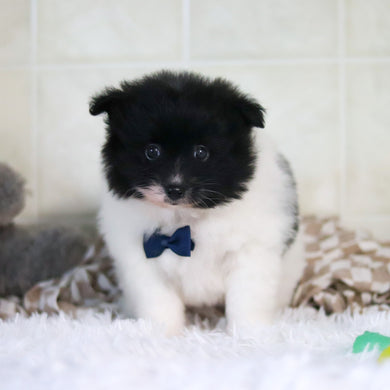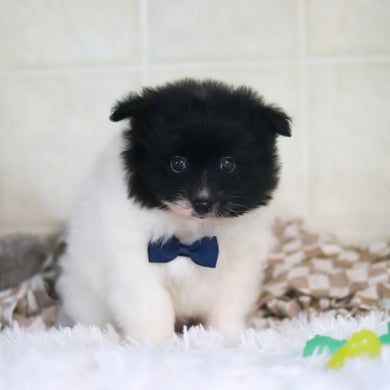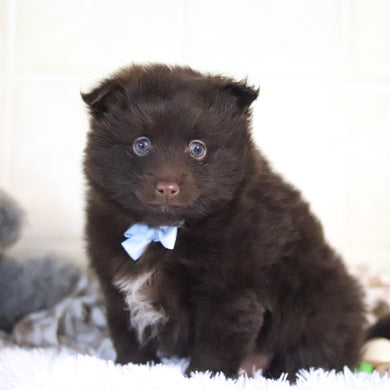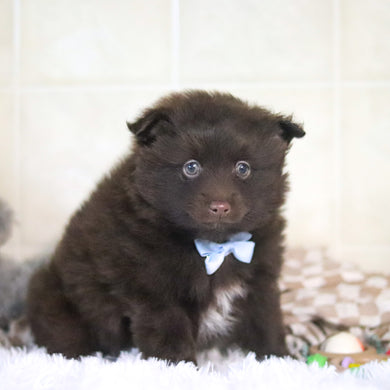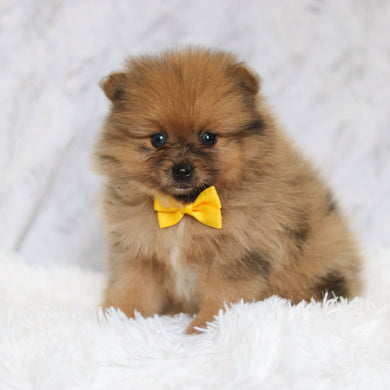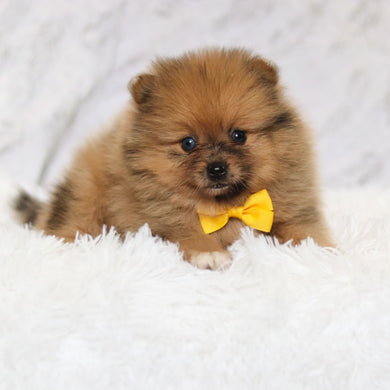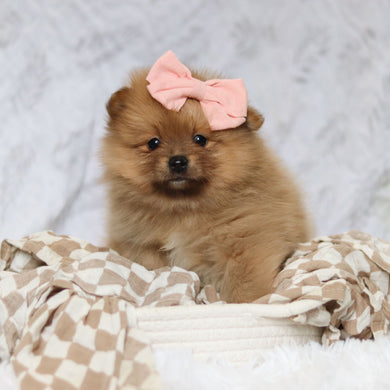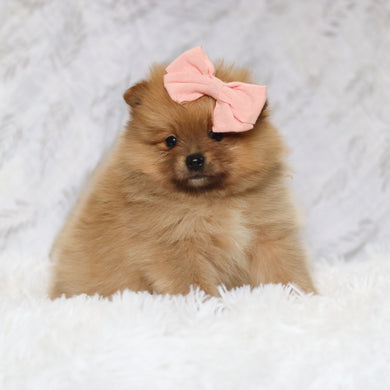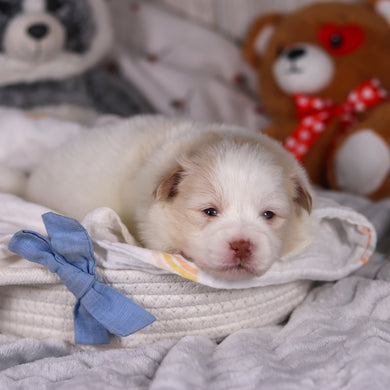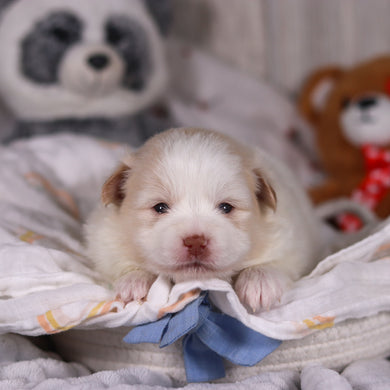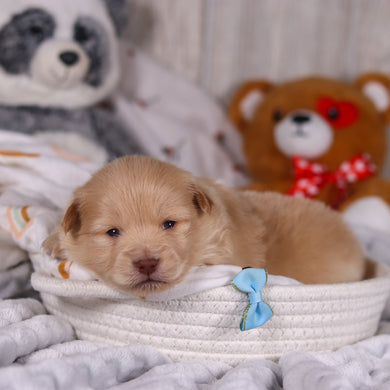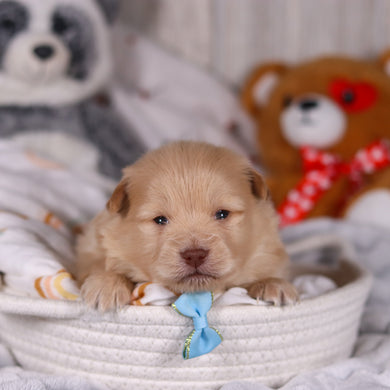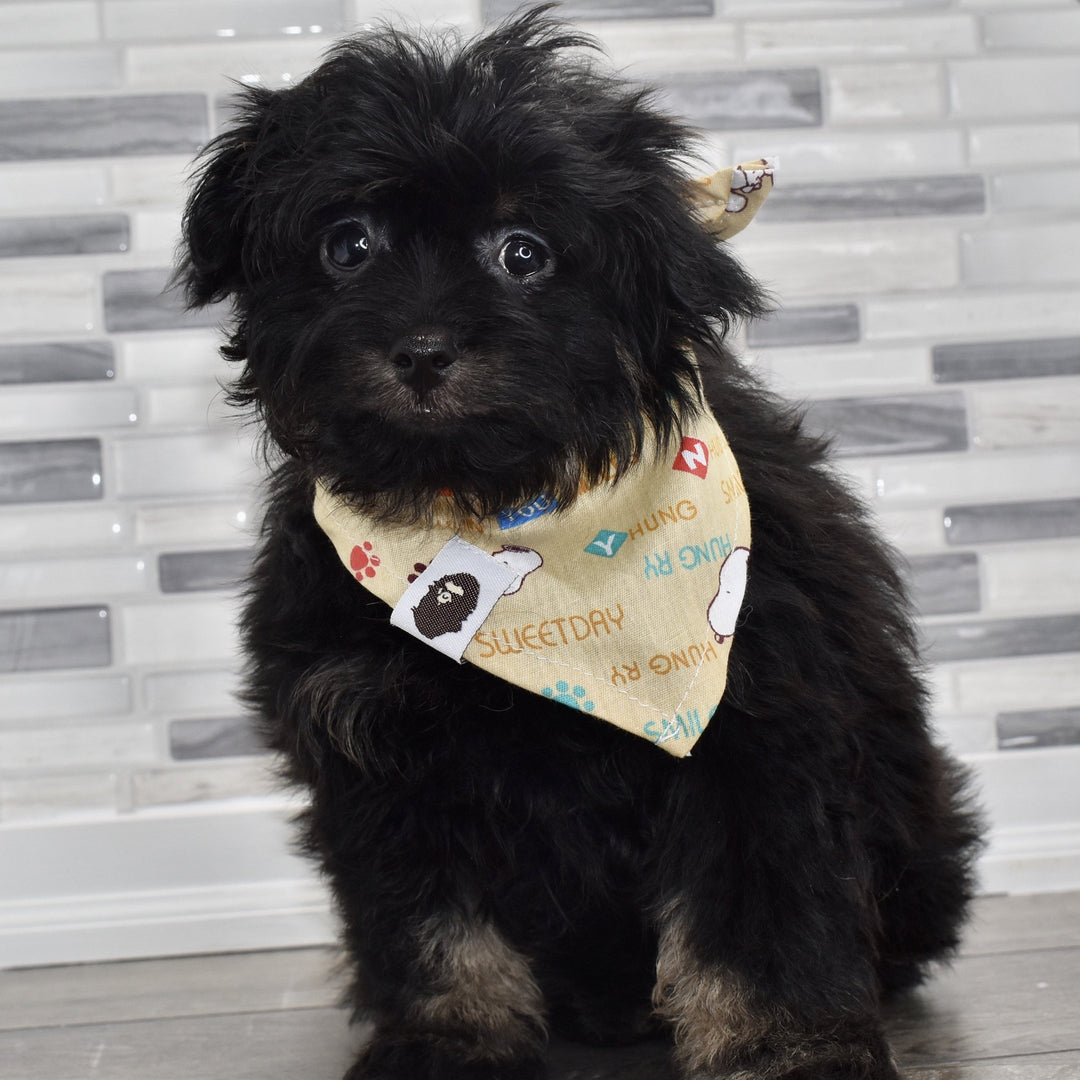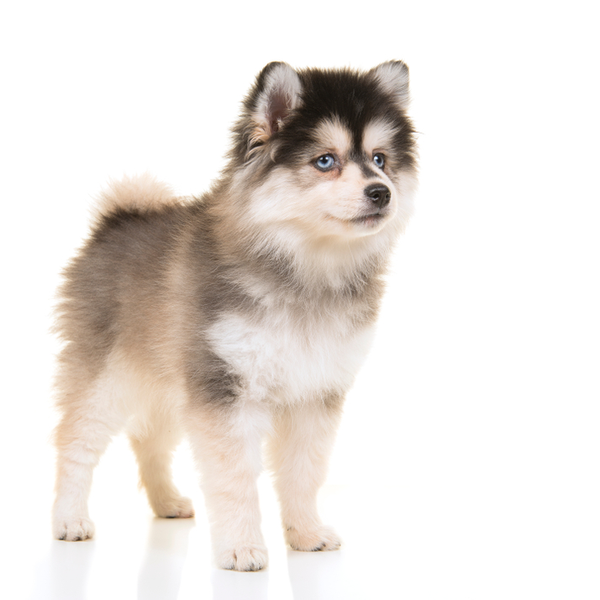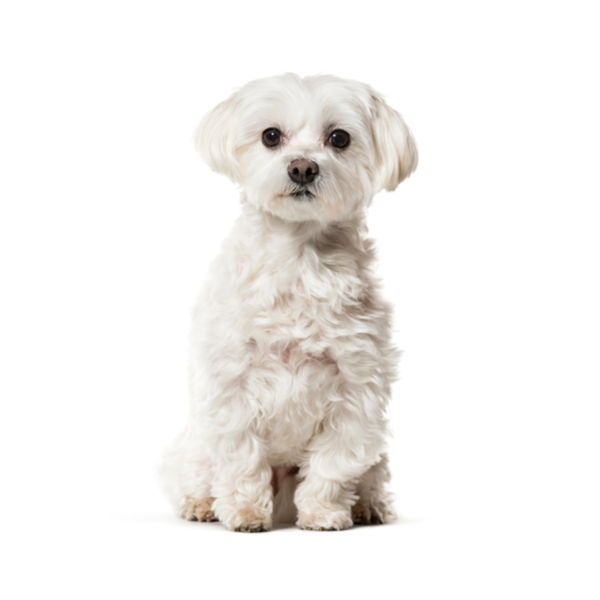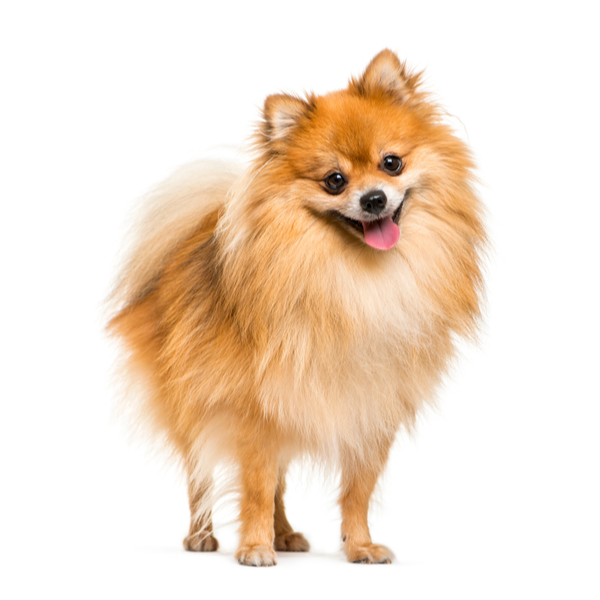
TEACUP POMERANIAN PUPPIES FOR SALE
Adorable. Playful. Fluffy.
Teacup Pomeranian puppies are the result of selectively breeding standard-sized Pomeranians to create a miniature version of this beloved breed. Experienced breeders have produced these pint-sized furry companions by selecting smaller Pomeranians from each generation. While the exact combination of breeds used to create the Teacup Pomeranian may vary, the primary focus has been reducing the size while retaining all the endearing qualities that make Pomeranians so cherished.
In recent years, Teacup Pomeranian puppies have skyrocketed in popularity among pet enthusiasts worldwide, which is why you’ll find plenty of offers for Teacup Pomeranians for sale. Their petite size, fluffy coats, and vibrant personalities make them irresistible to those seeking a compact yet lively companion. In addition, their adaptability to various living situations, whether in apartments or larger homes, further adds to their appeal.
Happytail Puppies prides itself on being the trusted breeder of Teacup Pomeranian puppies. Our hands-on approach to breeding and raising puppies results in well-socialized, healthy, and happy companions ready to bring joy to their new families. Explore our collection of Teacup Pomeranian puppies for sale today and find your perfect furry friend.

Temperament
- Lively and playful: Teacup Pomeranians have a spirited demeanor and enjoy interactive playtime.
- Affectionate: They form strong bonds with their owners and enjoy being close companions.
- Vocal: These dogs are not shy about using their voice to communicate with their owners or to alert them of potential threats.
- Confidence: Despite their small size, the Teacup Pomeranian personality is often a demonstration of fearless attitude, showing confidence in various situations.
Explore your options online for Teacup Pomeranians for sale if these are the attributes you’re looking for in a furry companion.
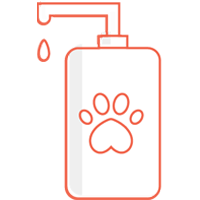
Appearance
One of the most striking features of Teacup Pomeranians is their luxurious double coat, which consists of a dense, soft undercoat and a longer, coarser outer coat. This plush fur comes in a variety of colors, including but not limited to cream, orange, sable, black, blue, and parti-color combinations. Their fluffy mane and plumed tail add to their overall charm, making them resemble miniature lions with their majestic appearance.
Build:
- Small and compact stature
- Sturdy frame with well-proportioned features
- Teacup Pomeranian size: Their height ranges from 7 to 12 inches at the shoulder and their weight typically ranges from 2 to 5 pounds
- The typical Teacup Pomeranian adult size is 7 to 12 inches (18 to 30 centimeters) tall and 11 to 12 inches (28 to 30 centimeters) in length.
Coat Type and Available Colors:
- Luxurious double coat with a soft undercoat and longer outer coat
- Coat colors include cream, orange, sable, black, blue, and parti-color combinations

Exercise
Potential owners can provide exercise for Teacup Pomeranians through a combination of indoor and outdoor activities. Interactive toys and puzzle feeders can keep them mentally stimulated, while short walks or indoor play sessions can help fulfill their exercise needs. Additionally, participating in obedience training or agility classes can provide both physical and mental stimulation for these intelligent dogs.
Recommended exercise for Teacup Pomeranians:
- 20 to 30 minutes of physical activity per day
- Approximately 5 to 7 miles of walking per week, divided into multiple short walks
It's important to monitor their activity levels and adjust as needed based on their individual energy levels and health status.
The Evolution of Teacup Pomeranian Puppies
The journey of Teacup Pomeranian puppies represents the dedication of breeders to building smaller versions of the standard Pomeranian while preserving their unique qualities and traits.
• Origin
The history of Teacup Pomeranian puppies traces back to the expansive fields of Pomerania in Europe, where their forebears, the standard Pomeranians, roamed as larger working dogs centuries ago. Initially prized for their prowess in herding and sled-pulling, these early Pomeranians showcased robust builds and boundless energy. However, as society evolved and lifestyles shifted, there arose a demand for smaller, more manageable canine companions with the same endearing traits.
• Breeding Practices
Enter the era of selective breeding, where dedicated enthusiasts endeavored to shrink the Pomeranian without compromising its distinctive appearance and spirited personality. Through meticulous pairings and careful genetic selection, breeders successfully sculpted miniature versions of the standard Pomeranian, paving the way for the emergence of the Teacup Pomeranian.
• Growing Fame
Today, these pint-sized bundles of fluff enchant dog lovers worldwide with their compact frames, luxurious coats, and effervescent dispositions. While their ancestors toiled in the fields of Pomerania, Teacup Pomeranian puppies now reign as cherished household pets, adored for their undeniable charm and unwavering loyalty. Their journey from sturdy working dogs to beloved companions epitomizes the enduring bond between humans and canines throughout history.
Ensuring Well-Being of Teacup Pomeranian Puppies
Proper observation, routine vet check-ups, and a fulfilling environment can help ensure that Teacup Pomeranian puppies thrive despite possible health challenges.
Major Health Concerns
Teacup Pomeranian puppies, despite their adorable stature, may encounter several significant health issues that necessitate attention and proactive management:
- Patellar Luxation: This condition, common among small breeds, involves the dislocation of the kneecap, which can lead to discomfort and mobility issues.
- Entropion: Teacup Pomeranians may experience inward rolling of the eyelids (entropion), which can cause irritation and potentially impair vision if left untreated.
- Mono/Bilateral Cryptorchidism: Some male Teacup Pomeranians may exhibit undescended testicles, a condition known as cryptorchidism, which can increase the risk of testicular cancer and fertility issues.
- Legg-Calve-Perthes Disease: This degenerative hip condition can affect Teacup Pomeranian puppies. The deterioration of the hip joint leads to lameness and discomfort.
- Collapsed Trachea: Due to their small size, Teacup Pomeranians are susceptible to a collapsed trachea, which can cause respiratory distress and coughing.
Minor Health Concerns
While less severe, these minor health issues can still impact the well-being of Teacup Pomeranian puppies:
- Cataracts: Senile or congenital cataracts may develop in some Teacup Pomeranians, potentially affecting their vision.
- Allergies: Environmental or food allergies can manifest in Teacup Pomeranians, leading to skin irritation and digestive disturbances.
- Epilepsy: Seizures may occasionally occur in Teacup Pomeranian puppies, necessitating veterinary evaluation and management for optimal quality of life.
Maintenance of Teacup Pomeranians
For proper maintenance of Teacup Pomeranians, potential fur parents should consider the following:
1. Regular grooming:
Teacup Pomeranians have a dense double coat that requires regular grooming to prevent matting and tangling. Brushing their coat several times a week helps to remove loose hair and to avoid skin issues. Regular nail trimming, ear cleaning, and dental care are essential to their grooming routine.
2. Balanced diet and exercise:
Providing a balanced diet tailored to their size and energy levels is crucial for the health and well-being of Teacup Pomeranians. Avoiding overfeeding and providing regular exercise helps prevent obesity, which can lead to various health issues. Short walks, indoor play sessions, and interactive toys are excellent ways to keep them mentally and physically stimulated.Common sicknesses to watch out for in Teacup Pomeranians include:
-
Hypoglycemia:
Teacup Pomeranians are prone to hypoglycemia, a condition characterized by low blood sugar levels. Symptoms may include weakness, lethargy, trembling, seizures, and disorientation. Immediate treatment with sugar or glucose is necessary to raise their blood sugar levels. -
Luxating patella:
This condition involves the dislocation of the kneecap, which can cause lameness, limping, and discomfort. Teacup Pomeranians may be predisposed to this condition due to their small size. Surgical intervention may be required to correct severe cases. -
Dental problems:
Teacup Pomeranians are susceptible to dental issues such as periodontal disease, tooth decay, and plaque buildup. Regular dental care, including brushing teeth and providing dental treats or toys, can help prevent dental problems.
Regular monitoring of their health, prompt veterinary care, and preventive measures can help ensure the long-term health and happiness of Teacup Pomeranians.
Frequently Ask Questions
Q: How much is a Teacup Pomeranian?
A: The price varies depending on location, demand, and other factors.
Q: Where can you buy Teacup Pomeranian puppies for sale?
A: Browse our catalog to find pups that suit you.
Q: How big is a teacup pomeranian?
A: Teacup Pomeranians typically weigh between 2 and 5 pounds and stand around 7 to 12 inches tall at the shoulder.
Q: How much does a teacup pomeranian weigh?
A: Teacup Pomeranians typically weigh between 2 to 5 pounds.

